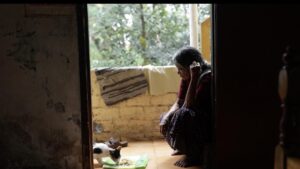The Kolkata-based film festival will focus on Canadian experimental films

A still from what we eat by Natalia Ehret which will be exhibited as part of EAEFF. | Photo credit: Special Arrangements
Whatever diplomatic ties it has at the moment, Canada will be in the spotlight at the five-day festival of experimental films to be held in Kolkata from Wednesday (November 6, 2024).
The Emami Art Experimental Film Festival (EAEFF), in its third edition, will showcase more than 50 films and this year is supported by organizations such as the Canada Council for the Arts, the Coventry Biennial, the Embassy of Switzerland and the Goethe Institute.
“Canada has been an important part of EAEFF through multiple editions. At our last festival, Canadian filmmaker Solomon Nagler created a session on Canadian experimental film and served as a judge. This year, he returns for a master class with collaborator Alexandre Larose, which increases our spotlight on Canada’s unique contribution to experimental cinema,” said Usmita Sahu, Director and Chief Curator of Emami Art.
“Our focus on Canada this year celebrates the country’s legacy in alternative moving-image practice. An influential figure like Nagler has led Canada in non-narrative film, which has inspired EAEFF to showcase this rich tradition and introduce audiences to new perspectives in cinema,” said Ms. Sahu.
He said that EAEFF, held at the Kolkata Center for Creativity, started as a modest screening project but has since become a prominent festival within South Asia, especially for those invested in avant-garde cinema, video art and alternative film forms.
“What sets it apart from traditional film festivals is its unique presentation method: instead of focusing on typical screenings, it embraces the white-cube gallery format. It seeks to introduce Indian audiences to the reflective and craft-based dimensions of experimental cinema – a genre that has been an integral part of Western cultural discourse for decades,” Ms Sahu said.
This year, he said, the festival took a significant turn by expanding its scope to include a wide range of critical productions, from experimental films to video art to artists’ moving images. “Our curated screening program will feature some of South Asia’s most critically acclaimed experimental films. Additionally, we are partnering with renowned experimental filmmakers and contemporary artists, including Alexandre LaRose, Solomon Nagler, Ria Rizaldi, Nicole Bachmann, Thomas Kern, Elodie Pong and Ritu Sattar,” he said.
Mr. Nagler and Mr. LaRose will present experimental film programs exploring themes of memory, displacement, and the cinematic medium. Mr. Nagler’s films are characterized by fragmented shapes, evoking history and loss; While Mr. LaRose’s films focus on the medium and the materiality of personal memory through multi-layered exposure.
has been published – November 05, 2024 10:43 pm IST



